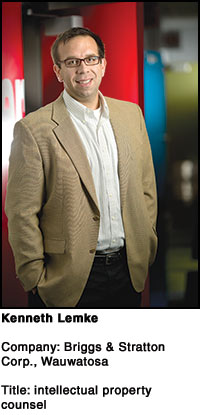Lemke puts plans, products in motion
By: Jane Pribek//August 19, 2013//
 While many lawyers’ offices contain shelves of reports, Ken Lemke is surrounded by connecting rods and other engine parts.
While many lawyers’ offices contain shelves of reports, Ken Lemke is surrounded by connecting rods and other engine parts.
Lemke, intellectual property counsel for Briggs & Stratton Corp., holds a mechanical engineering degree and can take a lawnmower engine apart, although reassembling it might prove challenging, he acknowledged with a laugh.
“What I like about where I work now is it involves parts, things you can put your hands on,” he said. “In my previous job, I did a lot of software work. It was sophisticated technology, but a step removed, on a computer screen.
“Here, a huge part of our business is engines, but also the end products: tractors, generators and snow throwers, and I really enjoy that.”
New product development especially is exciting, he said, because he then helps an innovative idea evolve into a marketable product.
Lemke worked at Foley & Lardner LLP, Milwaukee, for three years before going in-house, first at Pfizer and then GE Health Care. In 2008, he came to Briggs.
“It was an opportunity to work at a smaller legal department,” he said, “where I thought I’d be able to make more of an impact, being closer to the business as a whole.”
Throughout his career, Lemke’s work has consisted largely of patent prosecution and opinion work, which he continues to do at Briggs. But now he’s more of a generalist, also practicing in trademarks, contracts, advertising review, deals and new product development.
Lemke believes strongly in the patent system as the best means of protecting inventors and sparking ingenuity.
To that end, as an extracurricular, he and attorney Jason Pauls of Quad Graphics recently assembled a group of other in-house IP lawyers working for manufacturers. They will review proposals designed to curb the use of tactics employed by “non-practicing entities,” also known pejoratively as “patent trolls.” Typically, these are patent-holders who don’t manufacture or use the patented item, but then aggressively enforce their rights against alleged infringers. One tactic, for example, is to make prohibitive settlement demands, because they know patent litigation is extremely costly.
“IP lawyers here in the Midwest often aren’t represented well in Congress,” Lemke explained. “Most lobbying is done by high-tech companies, putting forth a large, concerted effort. So we decided to form a group and to try to have our voice heard.”












